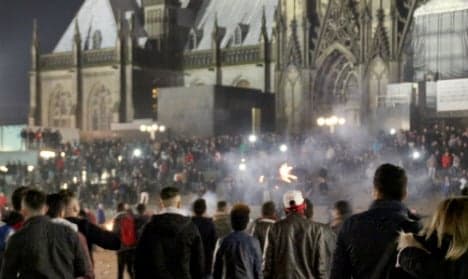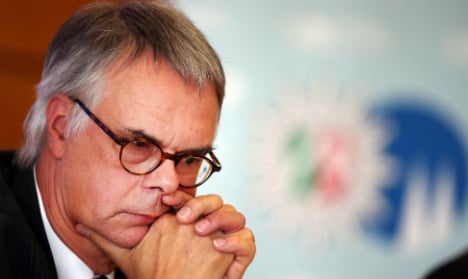Cologne police face fresh NYE cover-up claims

Cologne authorities face building pressure over the mass sexual assaults committed against women in the city on New Year's Eve, with some calling for the police chief to step down after reports he hid asylum seekers' involvement in the crimes.
Die Welt reported interviews with several police officers involved in the action around Cologne's main train station on New Year's Eve, where a large crowd of men, reportedly of Arab or north African appearance, gathered to drink and set off fireworks, with some harassing women.
Officers told Die Welt that large numbers of people had had their identities checked, with some taken into temporary custody.
"Among the identity checks that were carried out, the majority of people were only able to produce evidence of registration as an asylum seeker from the Federal Office for Migration and Refugees [BAMF]," a police report dated January 2nd, seen by Die Welt, recorded.
That directly contradicts statements by Cologne police chief Wolfgang Albers in a press conference on Tuesday, when he said that police had little or no information about the background of the attackers.
 Cologne police chief Wolfgang Albers is under pressure over information officers say was kept out of official reports. Photo: DPA
Cologne police chief Wolfgang Albers is under pressure over information officers say was kept out of official reports. Photo: DPA
In its Friday edition, the Kölner Stadt-Anzeiger (KSTA) local newspaper alleged that police leaders had deliberately kept the identity of those behind the sexual assaults a secret – something the commander on the ground on New Year's Eve resisted strongly.
"It's no longer a question of 'if' but only of 'when' Albers will be forced to step down," tabloid Bild argued on Friday.
DON'T MISS: Silence on sex crimes will make racism worse
Merkel: 'fundamental' debate needed
Chancellor Angela Merkel said Thursday Germany must have a "fundamental" debate about how to integrate newcomers, as police identified 16 people suspected of a shocking rash of sexual assaults blamed on migrants.
As outrage grew over the assaults, which included two alleged rapes and several accounts of groping during New Year's Eve festivities in Cologne,
Kanzlerin #Merkel zu den Konsequenzen aus den Straftaten in der Silvesternacht in Köln https://t.co/UTFu4QVmcS
— Steffen Seibert (@RegSprecher) January 7, 2016
Merkel said citizens were right to raise serious questions.
She pledged strong action and stressed that "we must also speak again about the cultural fundamentals of our co-existence".
Welcoming the fact that large numbers of alleged victims have come forward, Merkel said there were "very serious questions that go beyond Cologne" for Germany.
The attacks have shown that there is in "some quarters, contempt for women," she said.
"We need to confront that with utmost determination," Merkel said, adding that she did not believe that the cases were isolated.
Politicians call for toughness
Across the political spectrum, politicians tried to latch onto growing public disquiet by proposing tougher police action and new laws dealing with sexual harassment.
"We must do everything so that such events never happen again," Interior Minister Thomas de Maizière, a close ally of Chancellor Angela Merkel, told the Rheinische Post newspaper.
A draft policy paper from Merkel's Christian Democratic Union (CDU) suggested that police be allowed to stop and search people without suspicion in times of "serious danger for public security and order".
Meanwhile, the draft calls for asylum seekers and refugees to lose their right to asylum if they are convicted of a crime.
"All the possibilities of international law" must be examined "to send criminal asylum seekers back home," Vice-Chancellor and leader of the Social Democratic Party (SPD) Sigmar Gabriel told Bild.
"Why should German taxpayers pay for foreign criminals' jail time?" he asked, arguing that the threat of imprisonment in countries of origin would be a greater deterrent than spending time in a German prison.
But the Green Party pointed out that in their rush to toughen laws for asylum seekers, leaders were forgetting that these were sexually-motivated crimes against women.
"A large part of the current anger is not against sexualized violence, but about the fact that the possible perpetrators looked north African and Arabic," Green Party politician Claudia Roth said.
As well as increased police presence in risky areas and tough punishment for the criminals, she called for improved counselling for victims of sexual assault.
Comments
See Also
Die Welt reported interviews with several police officers involved in the action around Cologne's main train station on New Year's Eve, where a large crowd of men, reportedly of Arab or north African appearance, gathered to drink and set off fireworks, with some harassing women.
Officers told Die Welt that large numbers of people had had their identities checked, with some taken into temporary custody.
"Among the identity checks that were carried out, the majority of people were only able to produce evidence of registration as an asylum seeker from the Federal Office for Migration and Refugees [BAMF]," a police report dated January 2nd, seen by Die Welt, recorded.
That directly contradicts statements by Cologne police chief Wolfgang Albers in a press conference on Tuesday, when he said that police had little or no information about the background of the attackers.
 Cologne police chief Wolfgang Albers is under pressure over information officers say was kept out of official reports. Photo: DPA
Cologne police chief Wolfgang Albers is under pressure over information officers say was kept out of official reports. Photo: DPA
In its Friday edition, the Kölner Stadt-Anzeiger (KSTA) local newspaper alleged that police leaders had deliberately kept the identity of those behind the sexual assaults a secret – something the commander on the ground on New Year's Eve resisted strongly.
"It's no longer a question of 'if' but only of 'when' Albers will be forced to step down," tabloid Bild argued on Friday.
DON'T MISS: Silence on sex crimes will make racism worse
Merkel: 'fundamental' debate needed
Chancellor Angela Merkel said Thursday Germany must have a "fundamental" debate about how to integrate newcomers, as police identified 16 people suspected of a shocking rash of sexual assaults blamed on migrants.
As outrage grew over the assaults, which included two alleged rapes and several accounts of groping during New Year's Eve festivities in Cologne,
Kanzlerin #Merkel zu den Konsequenzen aus den Straftaten in der Silvesternacht in Köln https://t.co/UTFu4QVmcS
— Steffen Seibert (@RegSprecher) January 7, 2016
Merkel said citizens were right to raise serious questions.
She pledged strong action and stressed that "we must also speak again about the cultural fundamentals of our co-existence".
Welcoming the fact that large numbers of alleged victims have come forward, Merkel said there were "very serious questions that go beyond Cologne" for Germany.
The attacks have shown that there is in "some quarters, contempt for women," she said.
"We need to confront that with utmost determination," Merkel said, adding that she did not believe that the cases were isolated.
Politicians call for toughness
Across the political spectrum, politicians tried to latch onto growing public disquiet by proposing tougher police action and new laws dealing with sexual harassment.
"We must do everything so that such events never happen again," Interior Minister Thomas de Maizière, a close ally of Chancellor Angela Merkel, told the Rheinische Post newspaper.
A draft policy paper from Merkel's Christian Democratic Union (CDU) suggested that police be allowed to stop and search people without suspicion in times of "serious danger for public security and order".
Meanwhile, the draft calls for asylum seekers and refugees to lose their right to asylum if they are convicted of a crime.
"All the possibilities of international law" must be examined "to send criminal asylum seekers back home," Vice-Chancellor and leader of the Social Democratic Party (SPD) Sigmar Gabriel told Bild.
"Why should German taxpayers pay for foreign criminals' jail time?" he asked, arguing that the threat of imprisonment in countries of origin would be a greater deterrent than spending time in a German prison.
But the Green Party pointed out that in their rush to toughen laws for asylum seekers, leaders were forgetting that these were sexually-motivated crimes against women.
"A large part of the current anger is not against sexualized violence, but about the fact that the possible perpetrators looked north African and Arabic," Green Party politician Claudia Roth said.
As well as increased police presence in risky areas and tough punishment for the criminals, she called for improved counselling for victims of sexual assault.
Join the conversation in our comments section below. Share your own views and experience and if you have a question or suggestion for our journalists then email us at [email protected].
Please keep comments civil, constructive and on topic – and make sure to read our terms of use before getting involved.
Please log in here to leave a comment.